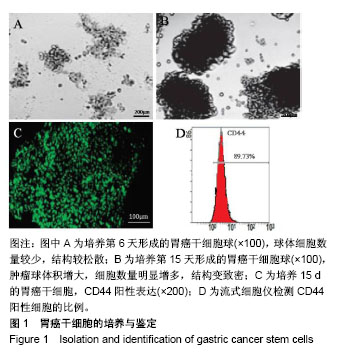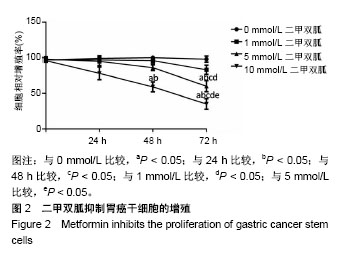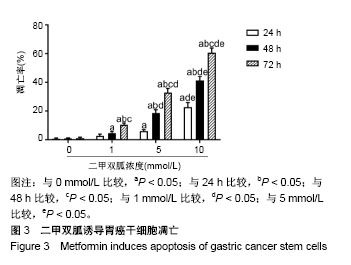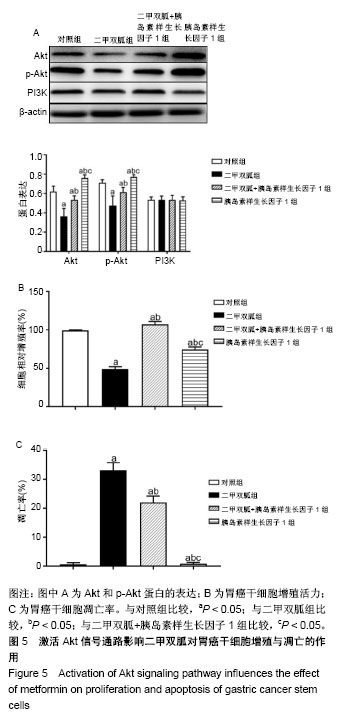| [1] Hu H, Song Z, Yao Q, et al. Proline-Rich Protein 11 Regulates Self-Renewal and Tumorigenicity of Gastric Cancer Stem Cells. Cell Physiol Biochem. 2018;47(4):1721-1728.[2] Akrami H, Moradi B, Borzabadi Farahani D, et al. Ibuprofen reduces cell proliferation through inhibiting Wnt/β catenin signaling pathway in gastric cancer stem cells. Cell Biol Int. 2018;42(8):949-958. [3] Li LQ, Pan D, Zhang SW, et al. Autophagy regulates chemoresistance of gastric cancer stem cells via the Notch signaling pathway. Eur Rev Med Pharmacol Sci. 2018;22(11): 3402-3407.[4] Shao Q, Xu J, Guan X, et al. In vitro and in vivo effects of miRNA-19b/20a/92a on gastric cancer stem cells and the related mechanism. Int J Med Sci. 2018;15(1):86-94.[5] Zhang L, Guo X, Zhang L, et al. SLC34A2 regulates miR-25-Gsk3β signaling pathway to affect tumor progression in gastric cancer stem cell-like cells. Mol Carcinog. 2018;57(3): 440-450.[6] Zhou X, Xiong ZJ, Xiao SM, et al. Overexpression of MPC1 inhibits the proliferation, migration, invasion, and stem cell-like properties of gastric cancer cells. Onco Targets Ther. 2017;10:5151-5163.[7] 黄辉,潘志坚.胃癌干细胞在胃癌侵袭、转移中及血管形成中的作用和机制[J].中国组织工程研究,2016,20(14):2021-2026.[8] 张丽贤,张宁,袁双珍,等.胃癌干细胞在肿瘤侵袭转移及对血管形成的影响[J].中国组织工程研究,2016,20(32):4738-4744.[9] Rush SK, Goff BA. Treatment of recurrent granulosa cell tumor with metformin and letrozole, a case report. Gynecol Oncol Rep. 2018;25: 60-62.[10] 张亚娜,马望,王峰,等.二甲双胍对胰腺癌和胰腺癌干细胞中ALDH1表达的作用[J].肿瘤防治研究,2017,44(3):177-183.[11] Li P, Zhang C, Gao P, et al. Metformin use and its effect on gastric cancer in patients with type 2 diabetes: A systematic review of observational studies. Oncol Lett. 2018;15(1):1191-1199.[12] 刘佳玲,童陈琦.二甲双胍抑制胰腺癌干细胞生长的实验研究[J].肿瘤学杂志,2016,22(6):467-472.[13] Jang JH, Song IH, Sung EG, et al. Metformin-induced apoptosis facilitates degradation of the cellular caspase 8 (FLICE)-like inhibitory protein through a caspase-dependent pathway in human renal cell carcinoma A498 cells. Oncol Lett. 2018;16(2):2030-2038.[14] 邹歌,陈燕.二甲双胍在卵巢癌治疗中的研究进展[J].华北理工大学学报(医学版),2017,19(2):160-164.[15] Joo MK, Park JJ, Chun HJ. Additional Benefits of Routine Drugs on Gastrointestinal Cancer: Statins, Metformin, and Proton Pump Inhibitors. Dig Dis. 2018;36(1):1-14.[16] Heckman-Stoddard BM, DeCensi A, Sahasrabuddhe VV, et al. Repurposing metformin for the prevention of cancer and cancer recurrence. Diabetologia. 2017;60(9):1639-1647.[17] Meireles CG, Pereira SA, Valadares LP, et al. Effects of metformin on endometrial cancer: Systematic review and meta-analysis. Gynecol Oncol. 2017;147(1):167-180.[18] Podhorecka M, Ibanez B, Dmoszyńska A. Metformin - its potential anti-cancer and anti-aging effects. Postepy Hig Med Dosw (Online). 2017;71(0):170-175.[19] Zhou JY, Xu B, Li L. A New Role for an Old Drug: Metformin Targets MicroRNAs in Treating Diabetes and Cancer. Drug Dev Res. 2015;76(6):263-269.[20] Noto H, Goto A, Tsujimoto T, et al. Cancer risk in diabetic patients treated with metformin: a systematic review and meta-analysis. PLoS One. 2012;7(3):e33411. [21] Scherbakov AM, Sorokin DV, Tatarskiy VV Jr, et al. The phenomenon of acquired resistance to metformin in breast cancer cells: The interaction of growth pathways and estrogen receptor signaling. IUBMB Life. 2016;68(4):281-292.[22] Yu Z, Zhao G, Li P, et al. Temozolomide in combination with metformin act synergistically to inhibit proliferation and expansion of glioma stem-like cells. Oncol Lett. 2016;11(4):2792-2800.[23] Shen X, Si Y, Wang Z, et al. Quercetin inhibits the growth of human gastric cancer stem cells by inducing mitochondrial- dependent apoptosis through the inhibition of PI3K/Akt signaling. Int J Mol Med. 2016;38(2):619-626.[24] 涂江江,董翠梅,陶利英,等. PI3K/Akt信号通路在胃癌干细胞中的表达及意义[J].中外医学研究,2017,15(2):154-155.[25] Courtois S, Durán RV, Giraud J, et al. Metformin targets gastric cancer stem cells. Eur J Cancer. 2017;84:193-201.[26] 李阳,赵永福.胃癌干细胞的分离、鉴定及其特性[J].中国组织工程研究, 2015,19(32):5188-5192.[27] 李霞,徐桂芳,张伟杰,等.胃癌干细胞的分离鉴定以及干细胞特性研究[J].胃肠病学,2014,19(9): 517-522.[28] 王一,向勇平,刘丹丹,等. 二甲双胍对ALDH~+胃癌干细胞的抑制作用及其机制[J].解放军医学杂志,2018,43(1):7-11.[29] Dou J, Pan M, Wen P, et al. Isolation and identification of cancer stem-like cells from murine melanoma cell lines. Cell Mol Immunol. 2007;4(6):467-472.[30] 窦骏.癌干细胞是肿瘤生长和复发的根源[J].科学通报,2017, 62(17): 1806-1814.[31] 周侠,缪珩.二甲双胍抗癌作用的研究进展[J].天津医药, 2017,45(7): 767-770.[32] Bhaw-Luximon A, Jhurry D. Metformin in pancreatic cancer treatment: from clinical trials through basic research to biomarker quantification. J Cancer Res Clin Oncol. 2016;142(10):2159-2171.[33] 张群慧,陈明卫,赵晓彤,等.二甲双胍对结肠癌干细胞增殖、凋亡及CD133表达影响的研究[J].中国糖尿病杂志, 2017,25(7):639-643.[34] Provinciali N, Lazzeroni M, Cazzaniga M, et al. Metformin: risk-benefit profile with a focus on cancer. Expert Opin Drug Saf. 2015;14(10): 1573-1585.[35] 祁迪,谭群友,王如文,等.吴茱萸碱抑制 PI3K /AKT通路诱导小细胞肺癌 H1688 和 H446 细胞凋亡[J].第三军医大学学报, 2016,38(4): 330-336.[36] Hamzehzadeh L, Atkin SL, Majeed M, et al. The versatile role of curcumin in cancer prevention and treatment: A focus on PI3K/AKT pathway. J Cell Physiol. 2018;233(10):6530-6537. |
.jpg)





.jpg)